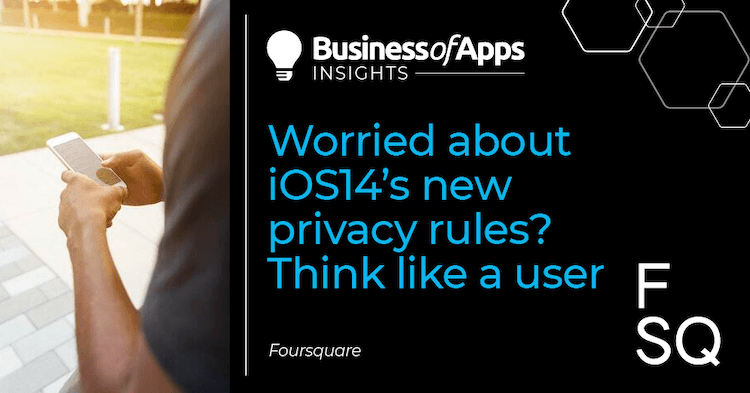
A great experiment in consumer choice and data privacy is underway – and everyone who owns an iPhone (which is 100 million people in the U.S. alone) gets a vote.
As most advertisers and developers are aware, the iOS 14 upgrade will soon feature a new data consent window that will appear in all apps that collect and share data with outside parties for advertising.
While many consumers might view this new feature as just another click-to-consent button, advertisers and developers know that an individual’s decision to consent to or refuse “Tracking” is a vote that has the potential to reshape entire business models and the entire App Store economy.
Of course, the average person using an iPhone might not think that the shifting business models of apps and other companies will affect them. What’s more, most people probably don’t think that their individual decisions about data have the power to affect the business landscape or determine whether a company lives or dies.
But in this case, that’s not true. Consumers’ decisions about their data will have a tremendous impact on the Future of the Internet (and business). And while clarity, transparency, and consumer control are unquestionable good for iPhone users and for the internet at large, developers still need to prepare for the iOS 14 rollout and mitigate any potential negative impact the new privacy notifications could bring to their business. This can be done by thinking like a user.
Here are three questions developers – as well as marketers and advertisers – must ask themselves as they prepare for the iOS 14 privacy updates:
Is this app or service something a user would be willing to pay a fee to use?
Do you pay $13.99 a month for Netflix? Maybe you paid $6.99 to download Minecraft, or $3.99 for Monopoly? Apps like these are profitable because you’re willing to part with your dollars to enjoy the content, functionality, or experience they offer. But many gaming, news, entertainment, and other apps that are free to download are supported by advertisers instead.
Both of these business models are legitimate and have pros and cons for users. But for apps that depend on advertising, data-sharing is critical. If enough users choose not to allow an app to collect their data, that app might be forced to switch to a subscription-based model or even shut down altogether.
So, as a developer, you must be certain that the quality and value of the product or service are abundantly clear to your users.
What benefit or value do users receive when they agree to share their data?
As a user, if you do choose to share your data, it should be clear why that app needs it. App developers should plan to provide users with extra information on a screen, of their own design and in as direct language as possible, that surfaces before Apple’s mandated consent notification.
Turn installs into active and engaged customers
Grow in-app revenue and build user loyalty with custom retargeting and churn prediction campaigns from Adikteev.
Get startedIn addition to providing extra context about what kind of data (e.g. email address vs. location data vs. contacts) the app would like to access and how they would like to use it, the developers should also explain how the user will benefit from consenting to data-sharing. Maybe certain functions in the app are improved by data sharing. Or perhaps the app is funded through data-sharing, and users would need to pay for downloads if the app can no longer collect data. No matter the reason, it’s crucial to make a good case for your user. In some cases, a user may decide there isn’t one, and deny the app access to their data. In many of those instances, the developers likely will have failed to do communicate the value of the data exchange effectively.
If you were a user and you knew how your data was being collected and used, would YOU be comfortable sharing it?
With no other context, choosing to allow “Tracking,” certainly sounds worrisome. But the truth that many users may not yet fully understand is that there are plenty of ethical companies with legitimate, user-experience-driven, or funding-related reasons for needing to collect user data.
But there are also morally questionable apps out there, so it’s also perfectly reasonable — and wise — for people to question whether to allow “Tracking” for each and every app that asks. But if an app isn’t using direct, clear language, it can be difficult to understand their privacy prompts. Sometimes, the decision comes from a user’s fundamental comfort level or gut feeling. This is why, in the future, developers should embrace laws dedicated to user privacy that can help regulate the language apps can use in such prompts. This may feel counterintuitive to many developers, but this will actually lead to more opportunities for data exchange because users will trust apps more and be more educated about the mutual value of data sharing.
At the end of the day, users should rigorously evaluate whom they share their data with and what those apps are planning to do with it. This will help eliminate bad actors within the industry. While it may require a bit of legwork and experimentation with language and notifications today, developers who choose to think like their users when it comes to data privacy will be the winners in the long run. For better or worse, Apple’s announcement has sent a message to every business that utilizes consumer data to fuel its marketing efforts: adapt, or get left behind.










